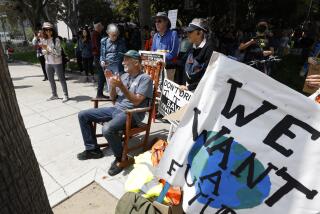Feeling the heat
The U.S. Chamber of Commerce touts itself as the worldâs largest business federation, boasting 3 million members. Er, make that 2,999,996. And falling.
The chamber has been beset by embarrassing headlines recently, as large companies that oppose the organizationâs hostility toward climate-change legislation head for the exits. The very public departures of three utilities -- San Francisco-based Pacific Gas & Electric, Albuquerque-based PNM Resources and Chicago-based Exelon Corp. -- were followed by Dear John letters to the chamber from Nike and Apple (Nike will keep its membership but resigned from the chamberâs board of directors).
The chamber has long been a standard-bearer for polluters, but as Congress has gotten closer to approving legislation to reduce greenhouse gas emissions, it has become increasingly combative. The last straw for the chamberâs defectors was its nonsensical proposal in August that the Environmental Protection Agency stage a âScopes monkey trialâ on global warming science -- a political stunt that annoyed corporate leaders who take the problem seriously.
The climate bill now in the Senate would benefit some businesses while costing others, posing a headache for associations such as the chamber. PG&E;, for example, stands to be a big winner because it generates a great deal of carbon-free hydropower and has invested heavily in wind and solar energy; nuclear-power giant Exelon also could make a killing on carbon credits. Defections by a handful of such companies wonât change the chamberâs stance on the climate bill, but the ensuing controversy has, mercifully, prompted its chief executive, Tom Donohue, to tone down his rhetoric.
Backers of the cap-and-trade climate bill argue that it would create green jobs and ultimately benefit the economy; opponents are equally enamored of predicting economic doom. There are too many variables and unforeseeable impacts for such forecasts to be very useful. Whatâs practically certain is that reinventing our energy infrastructure would be expensive, but cheaper than cleaning up the mess that would result if we didnât.
There are two ways of handling the coming climate changes, which, according to a recent U.S. government review of the available science, will jeopardize water supplies, destroy transportation infrastructure, blight crops and harm human health: We can impose a price on carbon and thus make those who produce or benefit from it pay a little now, or we can force all taxpayers to fund the far higher cost of repairing the damage later. The U.S. Chamber of Commerce is trying to sell the latter approach. Donât buy it.
More to Read
Inside the business of entertainment
The Wide Shot brings you news, analysis and insights on everything from streaming wars to production â and what it all means for the future.
You may occasionally receive promotional content from the Los Angeles Times.










